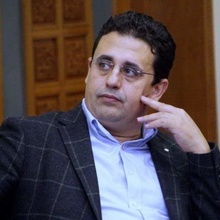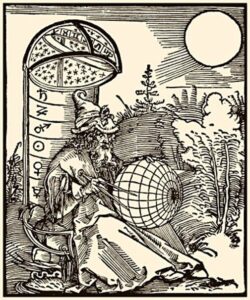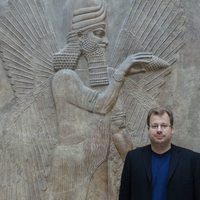(Link to Past MWS activities)
Speakers & Events Spring 2025
With the support of the Marquette University Philosophy Department, the Marquette Midwest Seminar in Ancient and Medieval Philosophy & the Aquinas and ‘the Arabs’ International Working Group is pleased to sponsor a seminar with Prof. Fouad Ben Ahmed on Ibn Rushd
(Averroes).

Thursday 1 May 2025, 3:30 pm, Marquette University Raynor Library 320a
Seeing as Knowing, Seeing as Believing: Ibn Rushd’s Theory of Vision from Philosophy to Theology
Fouad Ben Ahmed, Harvard University-Cambridge/Qarawiyyin University-Rabat
Abstract: Ibn Rushd’s theory of vision, developed in his philosophical, psychological, and scientific writings, refines the Aristotelian model of potentiality and actuality by integrating Galenic anatomy and Ibn al-Haytham’s optical insights. In works ranging from his commentaries on Aristotle’s De Anima to al-Kulliyyāt fī al-Ṭibb and the Compendium on De Sensu et Sensibili, Ibn Rushd conceptualizes vision as the immaterial reception of forms, requiring light, a transparent medium, a colored object, and a specific spatial relationship between observer and observed. Contrary to purely materialist or Platonic accounts, he argues that the organ of sight undergoes no physical alteration; rather, it becomes formally identical to what it perceives.
This theory operates in two main contexts. First, it illuminates Ibn Rushd’s broader epistemology, addressing how perception informs the intellect through the interplay of the active intellect, the material (hylic) intellect, and the imagination. Second, it undergirds his theological inquiries into the possibility of seeing God in the afterlife—a question largely overlooked in modern scholarship on his optical theory. By extending Aristotelian principles to debates about eschatological vision, Ibn Rushd reveals a nuanced synthesis of metaphysics, physiology, and philosophy, highlighting both his fidelity to multiple intellectual legacies and his originality in applying them to theological concerns. This study thus investigates not only the nature of human visual perception but also its implications for encountering the divine on the Day of Judgment.
The seminar will take place in Raynor Library Room 320a on the Marquette Campus and is open to students , faculty and other interested parties. Room seating capacity is ca. 15 so those who wish to attend in person must email their request to aaiwgevents@gmail.com. To arrange for attendance via TEAMS, send your name and academic affiliation to aaiwgevents@gmail.com at least two days in advance of the event.
===============================
The Marquette Midwest Seminar in Ancient and Medieval Philosophy presents
Professor Laurence Bloom,
Senior Lecturer, Department of Philosophy, Rhodes University
Pythagorean Themes in Plato’s Timaeus

Thursday, April 24 3:30 pm, Marquette Hall 105
“One, two, three… Where’s number four, Timaeus?” So begins Plato’s account of the visible cosmos. The unmistakable reference to the Pythagoreans—for whom the world is, or is composed of, numbers—has been clear to readers since at least Proclus. Less often noted, however, is the emphasis on incompleteness. It is this double reference, and the connectedness of the two referents, that I will be investigating in this talk. I will suggest that the connection between the rationality of number and the inherent lack of the natural world frames the discourse of the Timaeus. In short, the double reference suggests both a degree of intelligibility to the natural world and an inevitable lack to that intelligibility. I will argue that it is understanding that lack of intelligibility, and how to behave in the face of it, that is central to Plato’s project. Seeing that this is Plato’s concern will both open up and structure the text for us in interesting ways. As we will see, it will also be echoed in Socrates’ request to see his state in motion and in Timaeus’ own εἰκός μῦθος frame.
************************************
Speakers & Events for academic year 2023-24
The Marquette University Midwest Seminar in Ancient and Medieval Philosophy and the Aquinas and ‘the Arabs’International Working Group are pleased to host
29 February 2024, 3:30-5:00 pm
Prof. Darrell Dobbs, Department of Political Science, Marquette University
Marquette Hall 102, Marquette University (In-person event only)
Professor Dobbs studies ancient Greek philosophy, American constitutionalism, and Catholic social thought. He joined Marquette’s faculty in 1987, having taught at Tufts, Emory, and in the Honors College at the University of Houston. Over the past three and a half decades he has published extensively in the American Political Science Review, the American Journal of Political Science, and the Journal of Politics
“Figuring Out Plato’s Divided Line”
Abstract
Plato’s Divided Line ranks hypothetico-deductive cognition above the cognition of visible things. We know, however, that the Line’s specifications imply a parity between these two types of mental experience. But was Socrates aware of this implication? I uncover shortcomings in previous attempts to settle this matter and present rigorous geometric proofs and textual evidence in real dramatic time shedding light on Socrates’ (and a fortiori Plato’s) understanding of the Line.
2 November 2023, 3:30-5:30 US Central Time
Dr Jonathan Greig, PhD LMU Munich
Post Doctoral Scholar, University of Notre Dame
Room location Raynor Library 320a. Description of Dr Greig’s larger project.
“ Soul-Body Relation in Maximus the Confessor and its Roots in Aristotle, the Commentators, and Early Byzantines” Video Link to presentation HERE.
Abstract: In this paper I will discuss Maximus’ definition in some detail and make some initial connections to both Platonist, Aristotelian, and earlier Patristic accounts of the soul that Maximus may be drawing on, while attempting his own, unique solution to the question of the soul-body relation in the case of humans. In Ambiguum 7.40-42 (Constas), Maximus the Confessor, responding to the Origenist claim of the soul’s pre-existence, establishes a definition of the human soul as a “part” of the whole form of man, such that the soul cannot be conceived without its corresponding other “part” of the body, and vice versa. At face value this is perplexing: how can the soul be part of a whole, yet maintain its existence after the body’s death? Furthermore, Maximus defines the soul as having its own ousia in contradistinction to the body having its own ousia. But this would seem to contrast with his own account of the soul and body as “parts” of one form, which seems like the true ousia of the particular human: how can the substance/ousia of man imply two separate ousiai?
19 October 2023 1:00-6:00 pm US Central Time
AAIWG Mentoring Symposium
On Studying Philosophy in the Abrahamic Traditions
For details follow this LINK
5 October 2023, 3:30-5:30 pm US Central Time
Dr. Takashi Oki (PhD Oxford 2006),
JSPS Overseas Research Fellow, Faculty of Philosophy,
Christ Church, Oxford University
“Aristotle on the Infinite”
room location Raynor Library 320a
Abstract : Aristotle on the Infinite
Many of the interpretative questions about the infinite in Aristotle center around the potentiality/actuality distinction.
(1) I argue that Aristotle’s explanation which contrasts the infinite with a statue (206a18-21) should be taken to mean that the way in which the infinite exists potentially/actually is not the same as the way in which a statue exists potentially/actually, and not that the infinite, unlike a statue, does not exist actually. I criticize Hardie & Gaye’s (1930/1984) standard (but imprecise) translation of the passage, ‘something infinite will not be in actuality’ (206a20-21), and those who accept their translation (e.g. Bowin 2007).
(2) I propose interpreting Aristotle’s account of the infinite by analogy with ‘the Olympic games’ (206a24) as implying that, in his view, the infinite exists actually because of the fact that its parts become actual one after another. My contention is that Aristotle understands the infinite by division in actuality as a process composed of a repetition of becoming actually divided into a finite number of parts from being divisible, which can be repeated infinitely, rather than as a process of being divided infinitely in actuality as opposed to in potentiality (pace Hintikka 1966).
(3) It is mistaken or misleading, pace Coope (2012), to explain the incompleteness of the infinite by division in terms of ‘[being] incomplete while it is going on’, which belongs to a process of change as contrasted with an activity (Metaphysics Θ.6, 1048b18-35). By using the analogy with ‘the day and the contest’ (206a21-22), Aristotle intends to explain what belongs to the infinite by division in so far as it is infinite, and not to its finite counterpart. I also clarify why Aristotle does not explain the infinite by division by an analogous comparison to a process of a statue’s coming to be, a more familiar Aristotelian example of a process.
======================================
Speakers for academic year 2022-23
The Marquette University Midwest Seminar in Ancient and Medieval Philosophy is pleased to host
Gregory Sadler, Ph.D.
President, ReasonIO | Editor, Stoicism Today | APPA-certified Philosophical Counselor
Adjunct Professor in Philosophy and Humanities, Milwaukee Institute of Art and Design
Lecturer in Philosophy and Business Ethics, Carthage College
presenting
“Virtue Without The Mean: The Stoics On Virtue And Vice”
Abstract: Like many of their rivals in antiquity, the Stoic school articulated and advocated a robust and complex ethics centered around the virtues. Their views on the virtues and vices, happiness and misery, moral goodness and badness, and moral development are by their own admission paradoxical in some aspects. Some of them argue, for example, that there are no middle states between virtues and vices, that once cannot be more virtuous or vicious, and that virtues are not middle states between opposed vices. Critics from other schools point out what they take to be incoherences or even contradictions in the Stoic system in this matter, but even later Stoics like Seneca and Epictetus, and Stoic-sympathetic eclectics like Cicero evince some concerns with the orthodox Stoic position on virtues and vices. This talk will set out the paradoxical Stoic position on virtue and vice, examine best cases made for its plausibility, look at what its critics have to say, and examine Cicero’s, Seneca’s, and Epictetus’ approaches to the issues.
Marquette Hall 105, 3:30-5:00 pm US Central Time Wednesday 19 October
Video recording of this talk is available HERE. For the speaker’s three handouts, click HERE.
==========================================
Dr Elisa Coda (Pisa, Paris)
Marie Skłodowska-Curie Fellow
Centre Jean Pépin, Centre national de la recherche scientifique (Paris), France
presenting
“Thomas as a Reader of the De Anima through Themistius’s Lens”
Abstract: In the first part of this presentation I explain that Themistius agrees with Aristotle (De Anima 1.4) in rejecting the notion that the soul is a harmony, an issue raised and refuted in Plato’s Phaedo. For Themisitius, however, the reasons for this are founded on his own acceptance of Plotinian Platonism. In the second part I show that Thomas Aquinas in his mature Commentary on the De Anima (Sententia libri de anima) makes use of the Paraphrase of the De Anima of Themistius translated from the Greek by William of Moerbeke and holds for the transcendence and incorruptibility of the human intellect in accord with Themistius’s Plotinian Platonism. Unbeknownst to Aquinas, the thought of Plotinus can be viewed as one of his remote sources of his teachings on the soul.
Marquette Hall 105, 4:00-5:30 pm US Central Time Wednesday 7 September
Microsoft Teams meeting
Click here to join the meeting
This presentation will be recorded and made available here shortly after.
Speakers for academic year 2021-22
The Marquette University Midwest Seminar in Ancient and Medieval Philosophy is pleased to host
Nathaniel Taylor, PhD candidate, Marquette University, presenting
“Categories, Essence, and Modi Essendi: Avicenna at the Heart of Aquinas’s Metaphysics”
TEAMS Link (forthcoming)
1:00 pm US Central Time (Milwaukee) 9 September 2021 via TEAMS live video
The Marquette University Midwest Seminar in Ancient and Medieval Philosophy is pleased to host

Associate Professor of Byzantine Intellectual History at the University of Vienna
presenting
“Applied Aristotelian Logic in Ninth Century Constantinople. What the Emergence of a new Argumentative Method tells us about the Nature of Byzantine Philosophy”
Speakers for academic year 2020-21
The Marquette University Midwest Seminar in Ancient and Medieval Philosophy is pleased to host
Arnold Brooks, University of Chicago, presenting
“The Structure of Change in Aristotle’s Physics 6.4-6″
3:30 pm Monday 25 January 2021
===================
The Marquette University Midwest Seminar in Ancient and Medieval Philosophy is pleased to host
Rory Hanlon, University of Chicago, presenting
“Aristotle’s Unified Soul: the Figure-Soul Analogy and its Context”
12 October 2020, 3:30 – 5:00 pm
Video unavailable.
===================
The Marquette University Midwest Seminar in Ancient and Medieval Philosophy is pleased to host
Duane Long, J., State University of New York at Buffalo, presenting
“The Relation Between Logos and Thumos in EN 7.6, 1149a24-b3”
28 October 2020, 3:30 – 5:00 pm
Information contact: Prof. Owen Goldin at Owen.Goldin@Marquette.edu.